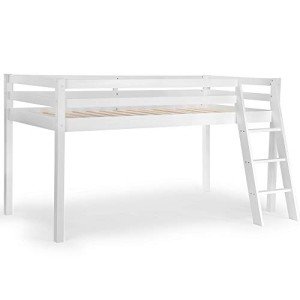This Story Behind Bunk Beds Sale Is One That Will Haunt You Forever!
Bunk Beds Sale: A Comprehensive Guide to Choosing the Right Bunk Bed for Your Home
Bunk beds have actually long been a staple in children's bedrooms, using a combination of space-saving efficiency and enjoyable. Whether accommodating More Help or sisters, friends on slumber parties, or simply taking full advantage of a playroom, bunk beds have actually become an important element in contemporary household homes. As sales on bunk beds increase, it ends up being increasingly essential for consumers to make informed decisions when acquiring one. This post will cover the essentials of buying a bunk bed, from types to security functions, as well as tips for maintaining the stability of your financial investment.
Types of Bunk Beds
When considering a bunk bed sale, it's essential to understand the different designs readily available on the market. Below are the most typical types:
Traditional Bunk Beds: These consist of two beds stacked one above the other, sharing a single frame. They are frequently the most cost-effective alternative.
L-Shaped Bunk Beds: This design includes one bed placed vertically and another horizontally. This arrangement produces additional space below the upper bed, which can be used for storage or a play area.
Lofted Beds: Similar to standard bunk beds however without any lower bed. Instead, the space beneath can be made use of for a desk, play location, or extra storage.
Triple Bunk Beds: For households with a bigger number of children or regular sleepovers, triple bunk beds supply 3 sleeping locations in a space-efficient design.
Futon Bunk Beds: These styles merge bunk beds and futon sofas. The bottom area transforms into a separate seating area, boosting functionality.
Convertible Bunk Beds: These beds can be separated into 2 specific beds, making them versatile as kids's needs alter in time.
Table 1: Comparison of Bunk Bed Types
Type
Description
Space Efficiency
Additional Features
Traditional Bunk Bed
2 beds stacked vertically
High
Most basic design
L-Shaped Bunk Bed
One vertical and one horizontal bed
Moderate
Play or storage space
Lofted Bed
Elevated bed with open space listed below
High
Work/play area
Triple Bunk Bed
3 stacked beds
Really High
Accommodates more users
Futon Bunk Bed
Bunk bed with a convertible futon
High
Multi-functional
Convertible Bunk Bed
Can be divided into two different beds
Moderate
Flexibility & & longevity
Safety Features to Consider
Security is vital when buying a bunk bed. Below are crucial safety features to look for:
Guardrails: Adequate guardrails need to be present on both sides of the upper bunk to avoid falls. They should be at least 5 inches greater than the bed mattress.
Ladder Design: Look for strong, broad ladders with slip-resistant rungs. Ensure that the angle is not too steep for simple access.
Stability: Ensure the bed is constructed with strong materials, such as solid wood or durable metal. The bed needs to not wobble when in use.
Weight Limit: Check the weight capacity of the bunk bed to guarantee it can accommodate the intended users safely.
Product Safety: If possible, select beds made from non-toxic products or those satisfying security requirements for kids's furnishings.
Table 2: Essential Safety Features
Function
Description
Value
Guardrails
Sides of upper bed to prevent falls
Vital for kid safety
Ladder Design
Strong, slip-resistant rungs
Aids safe and easy access
Stability
Construct quality to prevent wobbling
Ensures safety and durability
Weight Limit
Optimum weight capability
Avoids mishaps
Material Safety
Non-toxic, safe materials
Safeguards kids's health
Maintenance Tips for Bunk Beds
To extend the life of your bunk bed and make sure continuous security, think about the following upkeep ideas:
Regular Inspections: Periodically inspect the structure for loose screws, bolts, or any signs of wear. Tighten fasteners as needed.
Clean Periodically: Dust and clean the surface areas frequently. Usage appropriate cleaners that will not harm the surface.
Check Weight Limits: Be conscious of weight limitations, especially with older children or adults who may want to use the upper bunk.
Prevent Climbing on Guardrails: Educate children not to use guardrails for climbing or playing to minimize the threat of accidents.
Regularly Asked Questions (FAQs)
Q1: What is the age limit for children to safely utilize bunk beds?A: While it varies by the maker, many suggest that kids under six should not sleep in the upper bunk due to security issues.
Q2: How can moms and dads dissuade risky climbing?A: Setting clear guidelines about bunk bed usage and monitoring kids can assist. Additionally, using a bed camping tent can dissuade climbing while developing an enjoyable sleep environment.
Q3: What should I think about when embellishing a space with bunk beds?A: Ensure there is sufficient space around the bunk bed for safe motion, and utilize the design to create customized spaces for each kid.
Q4: Is a lofted bed appropriate for older children?A: Yes, lofted beds can be appropriate for older children as long as they meet safety requirements and the child is accountable enough to use them safely.
Bunk beds serve a functional purpose while adding a component of fun to a child's bed room. As sales of bunk beds continue to increase, careful consideration of types, security functions, and maintenance practices is necessary for moms and dads and caregivers. By comprehending these essential factors, families can discover the ideal bunk bed for their home, guaranteeing both usefulness and security for several years to come. Whether it's for siblings sharing a space or creating a relaxing sleepover space, a well-chosen bunk bed can offer happiness and usefulness, making it a worthy financial investment.
